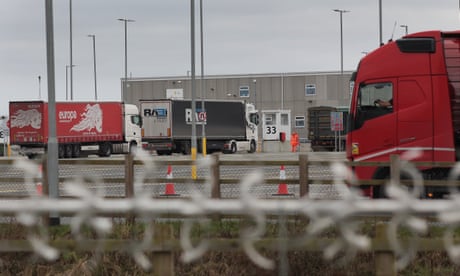
An inland facility set up to carry out checks on nearly all EU meat and dairy imports coming through Dover will be unable to cope when post-Brexit rules come in next month, the port’s health authority has warned.
The Dover Port Health Authority (DPHA) said the Sevington facility in Ashford, which is 22 miles inland, had not been designed to handle the scale of imports expected, and claimed its geographical position would “create an open door for disease and food fraud”.
The comments come just weeks before post-Brexit border rules are brought in on 30 April, which will require many meat, dairy and plant products from the EU to be physically checked at government border control posts (BCPs).
In November, the £147m Sevington facility was chosen by the government as the main BCP for food and plants moved via the Port of Dover, which handles a third of all EU trade.
In an excoriating letter, Lucy Manzano, the head of the DPHA, which is run by Dover district council, questioned the decision, pointing to “significant capacity and design limitations” at Sevington.
She wrote: “Sevington was designed as a site for checking sanitary and phytosanitary goods arriving via the Channel tunnel only – not as a combined site for all food arriving via Dover and the Channel tunnel.”
Manzano wrote that, in addition to the “infrastructure flaws”, the facility was unable to handle everything that had been asked of it by government, including hanging meat carcasses which come via northern France into Kent.
The decision to pick Sevington came despite the government initially indicating that the DPHA would carry out some checks within the Port of Dover itself, at its Bastion Point facility, which cost £23m and was only opened in spring 2022.
Since the decision was made, the authority has lobbied for Bastion Point to be reinstated as a BCP and last month revealed it had engaged lawyers over a potential legal challenge to the government’s plan.
Manzano wrote: “Moving the checks inland will undermine our entire British border and biosecurity system, creating an open door for disease and food fraud.”
She added that it would create a “gaping hole” in the border and increase the risk of “illegal, unfit, dangerous, and diseased” meat and food products coming into the country.
Manzano’s comments came in response to a letter written by the biosecurity minister, Robbie Douglas-Miller, in February, outlining the government’s border plan and explaining why it had chosen Sevington.
The letter included details of the government’s contingency plan if Sevington did become overwhelmed, with lorries being waved through without paper checks in a bid to ease congestion.
The parliamentary environmental and rural affairs select committee had previously written to the environment secretary, Steve Barclay, in January warning that an inland border could lead to potentially serious biosecurity risks.
Robert Goodwill, the committee’s chair, said this week that its concerns around the Sevington plan had still not been properly addressed.
A government spokesperson said: “We have strict border controls in place to protect food and animal health safety – and these, along with our high biosecurity standards, remain unchanged.
“The new border controls are being introduced progressively after extensive consultation with industry and are necessary to protect the UK’s biosecurity from potentially harmful pests and diseases.”